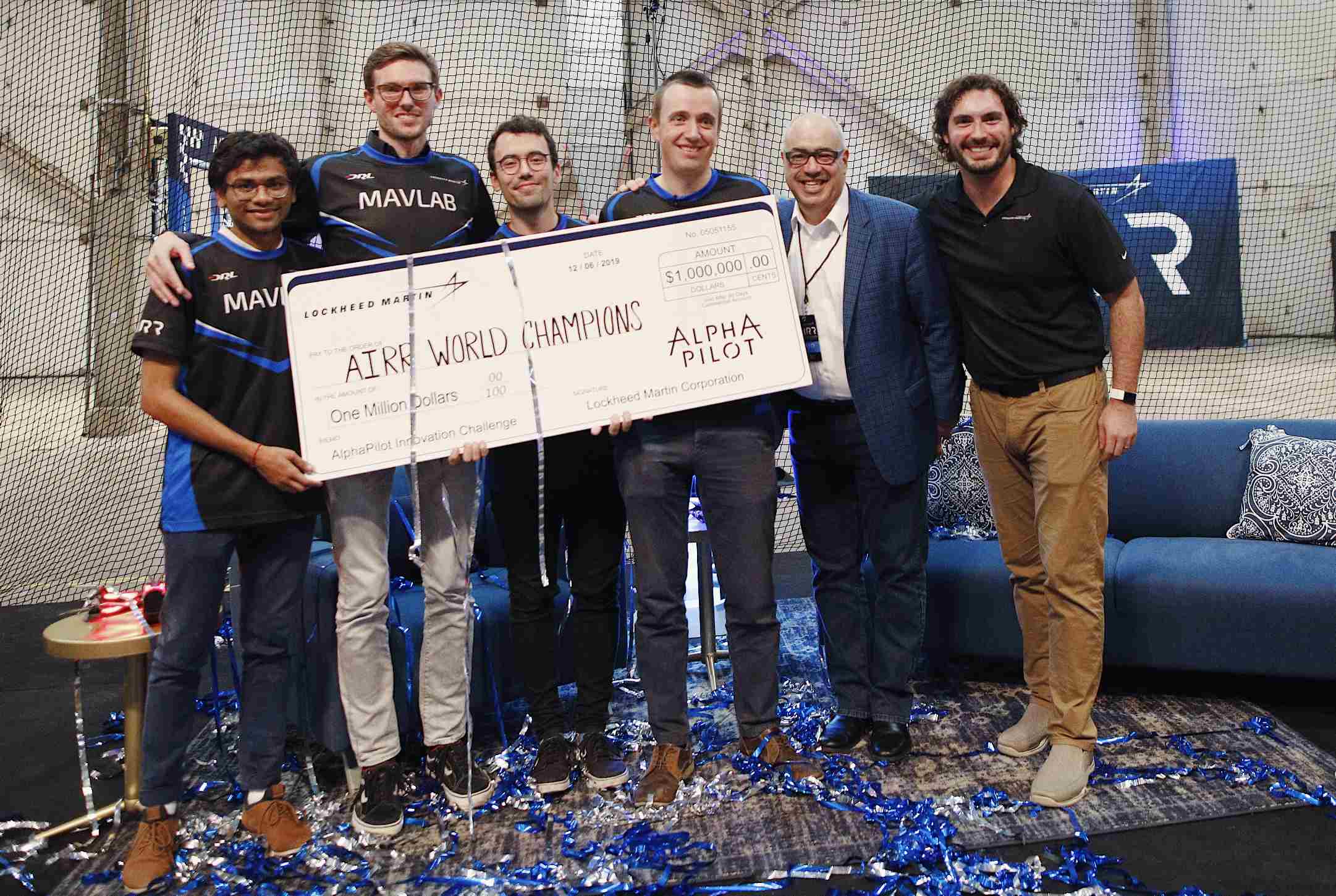MAVLab world champion in AIRR autonomous drone race 2019
A team from the Micro Aerial Vehicle Lab (MAVLab) of TU Delft has won the Artificial Intelligence Robotic Racing (AIRR) World Championship in Austin, Texas. The team takes home the first prize of 1 million US Dollars. With their autonomous drone race code they were the fastest in completing a race track, and with their innovative approach they placed themselves as the winner in a large international field of participants. The team considers winning this competition an important step towards bringing societal applications of drones closer.
Anyone who has ever seen an autonomous drone at work will probably be surprised by the low speed with which they fly when they are close to obstacles. Autonomous flying requires so much intelligence and computing power that the drone will soon lose out to a human drone pilot. "However, speed, agility and risk assessment are very important if you want to apply drones for new societal applications such as bringing a defibrillator to a person, or delivering a package at the door," says Christophe de Wagter, drone researcher at the Delft-based MAVLab. "After all, drones have only limited energy on board and also have to properly assess the situation and fly around obstacles at high speed.”
The professional drone racing organisation Drone Racing League (DRL) therefore presented drone developers with an extreme challenge: try to get an autonomous drone to complete a race track faster than a human drone pilot. For this purpose, they created the Artificial Intelligence Robotic Racing (AIRR) competition, which consisted of three preliminary rounds, followed by the World Championship in Austin, Texas.
The MAVLab team won the first prize in two of the three preliminaries, and had to give everything in the finals to stay ahead of the growing competition. The drone with their code flew the race track during the World Championship in just 12 seconds in a nerve-racking final.
As a 'bonus round' the team flew against a human drone pilot - Drone Racing League pilot Gabriel "Gab707" Kocher. He is one of the best drone pilots in the world, and won this race convincingly, but he admitted that the gap between the performance of human drone pilots and autonomous drones is getting smaller and smaller.
Human drone race pilot as a starting point
The winning approach of the MAVLab team is innovative. Where other teams mainly built on existing robot navigation methods, the Delft team took the human pilot as its starting point. De Wagter: "Inspired by human drone pilots, our drone learned to determine its own position in relation to the gates in a robust way, but also to predict the flight characteristics of the drone. The decisive factor was that the drone learned to assess the risks in order to be able to accelerate when things went well or to slow down when things did not go well. This made our solution fast and reliable."
Finally, the experience gained by the MAVLab in its research into very small manoeuvrable microdrones with limited computing power, such as the recently published DelFly Nimble in Science, played an important role in making very fast light code for the AIRR races.
Further development
The challenge of defeating a human pilot remains. In order to achieve this, further developments are needed that bring the drone even closer to its physical limits.
In addition, it is important to adapt the strategies developed to other applications, such as the rapid exploration of areas during rescue operations or the delivery of packages. The risk assessment strategy that the MAVLab has applied in their racing drone, for example, is already very suitable for this purpose: if there are no obstacles, a drone can safely fly faster, while in more complex environments with obstacles it will have to slow down in order to guarantee safety. In this way, the methods developed for drone racing can also provide an important advantage for other applications.
About the Artificial Intelligence Robotic Racing (AIRR) competition
The aim of the Artificial Intelligence Robotic Racing (AIRR) competition is to accelerate the application of Artificial Intelligence (AI) in drones through futuristic racing competitions. The competition consisted of three preliminary rounds and the final. After a series of tests, out of the 426 applications from 81 countries that received the AIRR competition, nine teams raced each other during the preliminaries and finals.
The participating teams had to use a standard drone, the DRL RacerAI. The drone has an NVIDIA Jetson AGX Xavier operating system and four stereoscopic cameras on board. The teams could not use GPS, data exchange or human intervention - so the quality of the code was decisive. The AIRR competition was organised by the Drone Racing League (DRL) and Lockheed Martin. The teams competed for the first prize of 1 million dollars.
More information
Website Artificial Intelligence Robotic Racing (AIRR) Circuit competition
Micro Aerial Vehicle Lab (MAVLab) TU Delft
Contactgegevens:
Christophe de Wagter (MAVLab TU Delft) c.dewagter@tudelft.nl
Ilona van den Brink (press office TU Delft) i.vandenbrink@tudelft, +31-15-2784259
MAVLab AIRR drone racing team
Christophe De Wagter
Guido de Croon
Federico Paredes-Valles
Nilay Sheth
Anoosh Hegde
Jelle Westenberger

